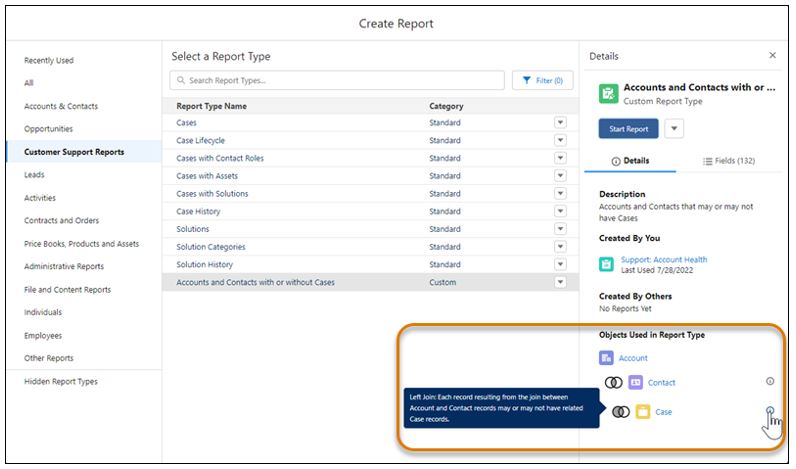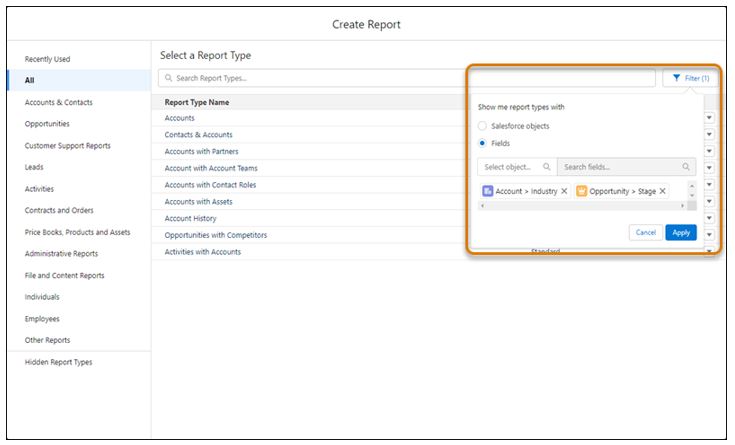In this blog, we take a look at the new features and updates to Salesforce Analytics from the Winter '23 release.
Custom Report Types
As well as further developments to CRM Analytics (covered elsewhere in this blog), we also see some improvements to the standard Reports & Dashboards as well. Here we are going to focus on two that affect Custom Report Types.
First up is the ability to now see the relationships in a Custom Report Type when taking the steps to create a new Report, allowing you to select the best one to meet your needs. To do this, you just need to start the process to create a new Report and when it prompts you to select a Report Type, you click on a custom one and the details show, as in the screenshot below. It will give you the details for which objects are included and will also explain the nature of the join - whether the related object may or may not have records, for example.

Any admin who has created a Report and realised partway through that they should have selected a different Report Type will welcome that change!
Next up is one to keep an eye on for the future – the ability to filter Custom Report Types by fields that you wish to have included. This one is currently in Beta which means that if you wish to use it, you will need to contact Salesforce Support to enable it, but how does it work?
Fairly simply, actually! When you create a new Report, and it prompts you to select the Report Type, you have the option to filter the Report Types available based on the fields you would like to have in them. You can choose from standard and custom fields and can select up to 20 fields to be filtered on.

A couple of points to note on this one - fields included via lookup or part of composite fields (such as geolocation or address) aren’t available as filter options. Again, a really useful tool in helping you ensure that you pick the right Custom Report Type at the first time of asking.
As we’re talking about reporting we should also look into some of the features coming to the analytics side of Salesforce:
Tableau CRM Data Templates
Anyone who has ever worked within CRM Analytics will tell you that one of the first learning curves you’ll face is to do with data integration. Not only do you need to learn the terminology such as data sync, connections, data prep, recipes etc. you also need to know how to set this all up to manipulate your data and create your datasets. It’s one of the first things that I teach my students in the ANC301 course and seeing their lightbulb moments is something I look forward to when teaching it.
What makes this so pertinent is the fact that other assets such as dashboards and stories have templates in CRM Analytics that allow users to get up and running quickly on some of the most common use cases. In this latest release, users now have access to Data Templates which is a pre-packaged process that contains data connectors, recipes and queries for common use cases. With the wizard, a user can customise for their use case, and this allows them to get started faster without having to start from scratch.

In my opinion, I feel this is how app templates will eventually be replaced, as they historically use dataflows rather than recipes. What you’ll also notice once you try this feature out is that you not only create the dataset, but also the app in which it will reside.
Please do not fret if you have been using templated apps that have created some massive dataflows, although still in beta, there is a convert to recipe tool that will ensure you do not lose what you have, you can either sign up or wait for general release to use it.
It has become very clear that the age of the dataflow is coming to an end so continue to be on the lookout to see how you can keep up with this trend and if needed we are more than happy to assist you through that process.
Reports and Dashboards in Slack
If you are a Slack user, you can now browse, search, view, share and subscribe to Lightning Reports and Dashboards with CRM Analytics. With this update, the reports and dashboards will show up in your recents, favourites and searches. Einstein Discovery will also be implemented to analyse reports, where you can share the predictions and recommendations with your team.
To view and share the report or dashboard, open the menu on said report or dashboard and share with your team. To use this feature, Users will need the Connect Salesforce with Slack permission. To utilise the subscriptions users must have the correct permissions. To use the predictions for lightning reports, Users need the View Einstein Discovery Recommendations permission.
If you want to know more about the Winter ’23 release, read our Platform and Marketing blogs, or watch the video here!